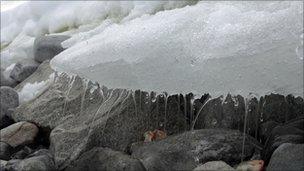India launches scientific expedition to South Pole
- Published

The scientists will look at the impact of global warming on the continent
India is to begin its first scientific expedition to the South Pole.
The head of India's National Centre for Antarctic and Ocean Research, Rasik Ravindra, will lead a team of eight scientists on the journey, departing next week from an Indian research base.
The trip to the pole and back is expected to last around 40 days.
It is hoped their mission will shed light on how environmental conditions have changed in Antarctica over the past 1,000 years.
Mr Ravindra says the scientists will fly via South Africa to India's Maitri research base, situated in an ice-free area known as the Schirmacher Oasis.
From there they will travel to the pole - a journey of more than 2,000km - in specially designed vehicles, carrying out a range of experiments on the way.
"We will conduct meteorological experiments, [and] record humidity, temperatures, wind speed and atmospheric pressures during the 20-day trip to the South Pole, and other experiments will be conducted on our way back," Mr Ravindra said.
"Everything is now linked to global warming," he added.
Other experiments will look at the movement of tectonic plates and how the Antarctic landmass has evolved over millions of years.
Correspondents say India is keen to draw international attention to its scientific presence in the region, and is building its third Antarctic research station. The first was abandoned in 1990.
- Published31 August 2010